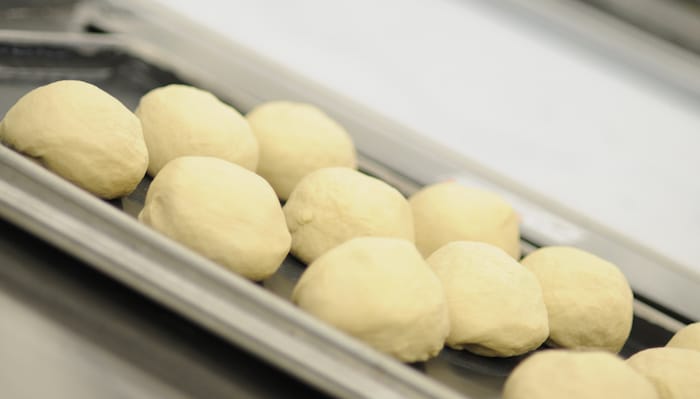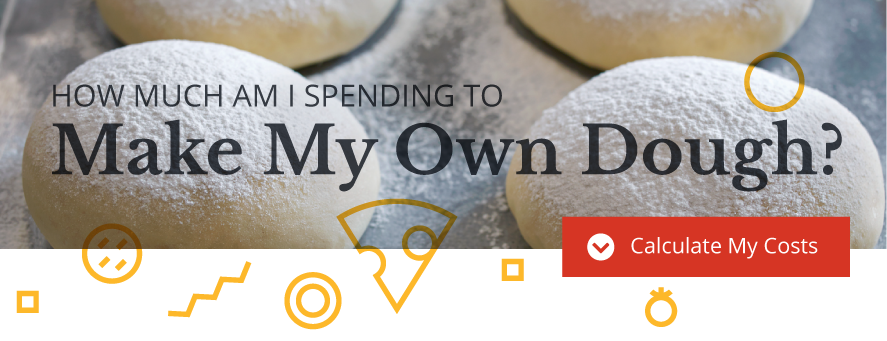
It’s an age-old debate: scratch-made or pre-made pizza dough?
Understandably, sentimental attachment to tradition or loyalty to family heritage may drive initial decisions around keeping dough-making — and the recipe — in-house. There may even be an argument made for pizzeria size, as scratch-making pizza dough for one or two locations is perceived as manageable.
The reasons are legitimate, but are they practical?
Decision Time: Scratch-made or Pre-made Pizza Dough?
Needs change. Minds change. Circumstances can and do radically change, as evidenced by the coronavirus (COVID-19) outbreak.
Before you fire up the mixer to do what you’ve always done, take a few moments to evaluate if you should stop scratch-making pizza dough. To help out, we’re providing three general criteria that could indicate it’s time to start using pre-made dough balls, as well as some tips for finding an ideal dough manufacturer.
1. Volume
When you first opened your doors, managing the demands of one shop was something you could likely handle alone or with a small staff. Fast forward to your current successful franchise. Juggling multiple restaurants, employees, kitchens and products is overwhelming. Perhaps you can’t keep up with making dough, or you make too much and end up throwing it out — a waste of effort, product and profits. Pre-made dough balls cut labor time, help you accurately respond to dough needs and prevent your kitchen from being in the weeds due to large, unanticipated orders.
2. Consistency
For small MSOs, mixing dough across locations could be a recipe for disaster. There is no way to account for the variances in water, weather, environment and other factors from city to city or even shop to shop, and that could impact crust performance. Pre-made dough balls are universally made in one facility, and recipes are carefully monitored and adjusted to accommodate external fluctuations. Pre-made dough balls can also be custom-matched to any recipe — even your family’s secret one — for uniform flavor and performance every time, at every location.
3. Staffing
Here’s the bottom line — no two people make the exact same dough. As your pizzeria grows and locations and/or staff are added, or maybe a go-to crust maker leaves, your pizza crust will show it. Pre-made dough balls provide consistent ingredient and product scaling, meaning the customer experience remains the same — and your reputation remains intact — regardless of any team or operational changes.
Some Simple Truths About Pre-Made Pizza Dough Cost and Quality
Perhaps you’ve discovered that it is, indeed, time for you to partner with a pizza dough manufacturer. It’s exciting to consider the possibilities, but you’ve heard things about cost and quality. You’re hesitant to pursue a supplier.
It’s true you’ll pay a little more upfront for pre-made dough balls. However, looking at the big picture, mixing your own pizza dough carries with it some hidden expenses like labor, equipment purchase and maintenance, and higher liability insurance premiums. These costs add up quickly, and could exceed the nominal price difference you pay for the convenience and consistency of pre-made dough balls.
It’s that convenience and consistency that leads many operators to believe pre-made pizza dough is chock full of preservatives. It’s a common misconception, but dough not made in your building doesn’t automatically contain ingredients you wouldn’t add to your own dough. In fact, many Dough Shop® dough balls carry clean labels — meaning all-natural ingredients and no added preservatives.
Partnering With a Pizza Dough Manufacturer
You’ve done your assessment. We’ve cleared up some lingering questions about cost and quality. It’s time to strategically partner with a dough manufacturer that meets your needs and exceeds your expectations — but how?
Finding a pizza dough manufacturer
The easiest way to connect with a dough manufacturer is to ask your current broadline or specialty distributor. Since they’re in the business of helping you find the products you want, they have a great feel for “what’s out there” and can guide you to manufacturers based on your operation, location and product needs.
And that brings up an important point. Before you contact your distributor, have a clear understanding of the characteristics and capabilities you need in your pizza dough. Knowing exactly what you want will help the distributor, but it will help you more.
Large distributors typically carry a variety of private labels, and may use them as a starting point for their recommendations to you. Ask specific questions about the dough based on your list of requirements — and maybe even do some independent research — to get the quality product you want. If a private label product meets your needs, great. If not, ask for additional options.
Once you’ve found a good manufacturer match, your distributor will typically do the initial legwork on your behalf. They’ll contact the manufacturer to set up a cutting and get some product samples sent to you. If you have unique challenges or specific requests, the manufacturer may call you directly to discuss next steps for outsourcing dough.
Minimum purchase requirements
Perhaps the biggest adjustment operators have to make when transitioning from making their own pizza dough to outsourcing is the minimum purchase requirement. In order to best serve customers and still remain profitable, manufacturers typically require that dough is bought in at least one- or two-week supplies. This is a manageable amount of product to use and store in a restaurant. The minimum for Dough Shop® dough balls, for example, is 18 cases — that lasts the average operator we work with about two weeks.
The operational impact of working with a dough manufacturer
For the most part, your pizzeria will not be affected by partnering with a dough manufacturer. You may see a shift in storage requirements as you’ll need more freezer space for pre-made dough and more refrigerator space to accommodate the extra day of proofing time for frozen dough. On the other hand, you’ll gain space in your pantry since you won’t have to stock bulk dry goods like flour, sugar and yeast, and you’ll need fewer team hours to handle the dough.
Choosing to work with a dough manufacturer offers benefits beyond reducing your prep time and stress level. You’re introducing a new level of convenience and versatility into your operation that builds business and likely saves money, not to mention helps you navigate the uncertainty and impact of the global pandemic. Crunch some numbers to find out for yourself! Use our Pizza Dough Cost Calculator to determine a per-dough-ball cost of making your own dough. Click the button below to access this handy tool.






